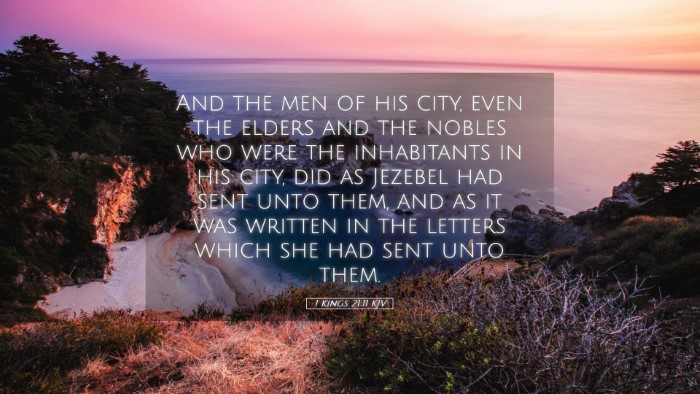Commentary on 1 Kings 21:11
Verse: "And the men of his city, the elders and the nobles who were the inhabitants of his city, did as Jezebel had sent unto them, and as it was written in the letters which she had sent unto them."
Introduction
This passage occurs within a powerful narrative that not only addresses issues of injustice, greed, and morality but also reflects the deep-seated struggles of God’s people during a time of great apostasy in Israel. The events leading up to this verse showcase King Ahab's personal failings and the manipulative role played by Queen Jezebel in orchestrating vile actions against Naboth, a victim of tyrannical greed.
Contextual Analysis
The context of this verse is pivotal. It highlights how leadership can be corrupted and how the authority they wield can be exploited for personal gain. The city elders and nobles, who should have been guardians of justice, instead succumb to the wicked commands of Jezebel, revealing a significant moral compromise within the leadership of Israel.
Role of Jezebel
Jezebel's influence is undeniable in this narrative. Her character often embodies the antithesis of righteousness and loyalty to God. According to Matthew Henry, her actions reveal not only her wickedness but also her boldness to manipulate societal structures to fulfill her own ambitions.
- Exploitation of Power: Jezebel's letter to the elders is an abuse of her position; she orchestrates a false execution to secure Naboth's vineyard for her husband, Ahab.
- Corruption of Justice: The elders and nobles, failing in their duty to uphold justice, become complicit in her scheme, demonstrating how evil can proliferate when leaders abandon their principles.
Understanding the Elders and Nobles
This passage also invites reflection on the leaders' roles within the community. As Albert Barnes points out, the elders and nobles were not simply passive participants; they acted with intention and willingness, demonstrating that the judgment of a society often reflects the moral state of its leaders.
- Failure of Leadership: Their compliance represents a failure of moral courage, as they prefer to maintain their favor with the monarchy rather than uphold justice.
- Collective Responsibility: This act implicates them collectively, suggesting that a society’s decay often begins with those entrusted with its governance.
Theological Implications
The implications of 1 Kings 21:11 are profound for understanding God’s justice. The behavior of both Jezebel and the elders poses a critical question: what happens when a society moves away from divine justice?
- Divine Justice vs. Human Corruption: This narrative underlines the tension between divine accountability and human corruption. According to Adam Clarke, God’s eventual judgment on Ahab and Jezebel underlines that sin does not go unnoticed.
- God's Sovereignty: The events anticipate God’s sovereign response to evil, establishing a theme that holds throughout biblical narrative—that justice will ultimately prevail.
Lessons for Church and Society
For contemporary pastors, theologians, and students, 1 Kings 21:11 serves as a cautionary tale about the misuse of power and the moral responsibility of leaders:
- Integrity in Leadership: Church and community leaders must strive for integrity and resist the temptations that lead to moral failure.
- Challenge of Culture: In a culture that might elevate material gain over justice, this passage calls for the church to stand firm in its commitment to biblical ethics.
- Vigilance against Complicity: Believers are reminded of the danger of complicity: just as the city leaders acted wrongly, individuals today must guard against societal norms that oppose divine principles.
Conclusion
1 Kings 21:11 encapsulates a moment of moral failure with far-reaching implications for Israel and, by extension, for all of humanity. Through the lens of this commentary, we see how submission to corrupt power can tarnish the ethical foundations of society. While the elders and nobles exemplified failure, the narrative leads us toward a hope that true justice, rooted in God’s character, ultimately prevails despite human sinfulness. This passage is a sobering reminder for all who lead, teach, or influence—the moral quality of our actions can either uplift or undermine the community of faith.


